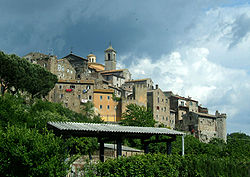Vetralla
| Vetralla | ||
|---|---|---|
| Comune | ||
| Comune di Vetralla | ||
 |
||
|
||
| Location of Vetralla in Italy | ||
| Coordinates: 42°18′38″N 12°04′45″E / 42.31056°N 12.07917°E | ||
| Country | Italy | |
| Region | Lazio | |
| Province / Metropolitan city | Viterbo (VT) | |
| Frazioni | Cinelli, Cura di Vetralla, Giardino, La Botte, Le Valli, Madonna del Ponte, Mazzacotto, Mazzocchio, Pietrara, Tre Croci | |
| Government | ||
| • Mayor | Sandrino Aquilani | |
| Area | ||
| • Total | 113.01 km2 (43.63 sq mi) | |
| Elevation | 300 m (1,000 ft) | |
| Population (31 December 2010) | ||
| • Total | 13,508 | |
| • Density | 120/km2 (310/sq mi) | |
| Demonym(s) | Vetrallesi | |
| Time zone | CET (UTC+1) | |
| • Summer (DST) | CEST (UTC+2) | |
| Postal code | 01019 | |
| Dialing code | 0761 | |
| Patron saint | St. Hyppolite | |
| Saint day | August 14 | |
| Website | Official website | |
Vetralla is a town and comune in the province of Viterbo, in central Italy, 11 kilometres (7 mi) south of that city, located on a shoulder of Monte Fogliano.
Vetralla's dominating fortified position in the heart of Etruscan territories has been continuously occupied since the Early Middle Ages. The Roman site, two kilometers distant, was a posting station on the Via Cassia; some ruins of walls and paving at S. Maria di Forcassi still mark the Roman Forum Cassii. The site was depopulated in the later Empire, when a smaller population retreated to the present strategic position commanding the valley, where it remained exposed to attack, in spite of the imposing walls that encircled it.
The little fortress had been incorporated into the Papal States from their historic beginnings with the Lombard king Liutprand's Donation of Sutri (728) to Pope Gregory II, but the lords of Viterbo held it from 1110 to 1134. By 1145, Pope Eugene III was installed at Vetralla, safely removed from the violence and party strife of Rome; from here he issued his bull Quantum praedecessores, calling for the Second Crusade.
The territory was given extensive woodlands by Pope Innocent III in 1206, which brought it into fierce contention with the lords of Viterbo who coveted the land. To this day, in the annual ceremonial Sposalizio dell'albero ("marriage of the tree"), the mayor of Vetralla reaffirms the town's rights of possession on Monte Fogliano. The fief was entrusted through the centuries to various noble families associated with the Papacy, as lords of Vetralla: first the Orsini, then the Di Vico until 1435, when the last lord Giacomo di Vico was forcibly ousted by the cardinal-condottiere Giovanni Vitelleschi, confined in the fortress of Soriano, then beheaded. Vetralla then passed in rapid succession among a series of Papal nobles: to Cardinal Giovanni Borgia, to Lorenzo Cybo (1529), and to Cardinal Alessandro Farnese in 1534.
...
Wikipedia


